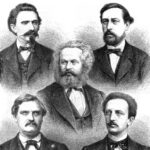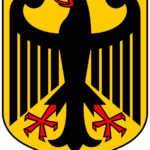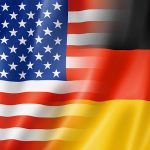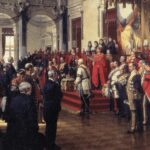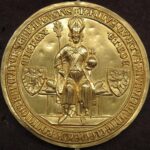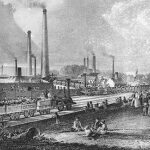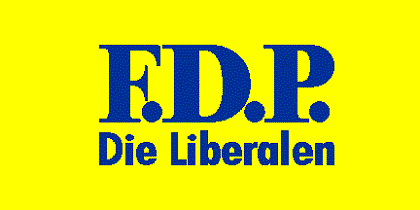 The Free Democratic Party (Freie Demokratische Partei–FDP) is much smaller than the CDU or SPD, but its limited electoral strength masks the party’s inordinate influence. Prior to the 1994 election, the FDP had experienced its worst results in national elections in 1969 (5.8 percent) and 1983 (7 percent). Both of those poor showings occurred following an FDP decision to switch coalition partners. Beyond these two exceptions, between 1949 and 1990 the FDP averaged 9.6 percent of the vote in national elections. Given its pivotal role in governing coalitions, the FDP has held over 20 percent of the cabinet posts during its time in government.
The Free Democratic Party (Freie Demokratische Partei–FDP) is much smaller than the CDU or SPD, but its limited electoral strength masks the party’s inordinate influence. Prior to the 1994 election, the FDP had experienced its worst results in national elections in 1969 (5.8 percent) and 1983 (7 percent). Both of those poor showings occurred following an FDP decision to switch coalition partners. Beyond these two exceptions, between 1949 and 1990 the FDP averaged 9.6 percent of the vote in national elections. Given its pivotal role in governing coalitions, the FDP has held over 20 percent of the cabinet posts during its time in government.
The FDP served in coalition governments with the CDU from 1949 to 1956 and from 1961 to 1966. As of mid-1995, it has governed with the CDU since 1982. The FDP governed in coalition with the SPD from 1969 to 1982. The remarkable amount of time that the FDP has spent in government has been a source of continuity in the German political process. FDP ministers carry a detailed knowledge of government personnel and procedures unsurpassed among the other parties.
The central role played by the FDP in forming governments is explained by the fact that a major party has been able to garner an outright majority of Bundestag seats only once (the CDU, in 1957); thus, the CDU and the SPD have been compelled to form coalition governments. Therefore, the FDP has participated in every government except the one from 1957 to 1961 and the Grand Coalition of 1966-69. Because the SPD and CDU/CSU enjoyed roughly equal electoral support, the FDP could choose with which major party it wished to align. This ability to make or break a ruling coalition has provided the small FDP with considerable leverage in the distribution of policy and cabinet positions. To take one example, as of mid- 1995, the FDP, in the person of Klaus Kinkel, led the Ministry of Foreign Affairs, which it has held since 1969. The most prominent member of the FDP, Hans-Dietrich Genscher, served as foreign minister from 1974 until his resignation in 1992.
The FDP was created in 1948 under the chairmanship of Theodor Heuss, who served as the first president of the Federal Republic, from 1949 to 1959. The party’s founders wanted the FDP to revive the liberal party tradition of pre-World War II Germany. Although there was some initial debate over what was meant by “liberal,” the party did articulate a political philosophy distinct from that of the two major parties. The FDP gave precedence to the legal protection of individual freedoms. Unlike the SPD, it supported private enterprise and disavowed any socialist leaning, and, unlike the CDU/CSU, it envisioned a strictly secular path for itself. In the early 1990s, the Free Democrats remained closer to the CDU/CSU on economic issues and closer to the SPD on social and foreign policy. Many Germans view the FDP as the party of the middle, moderating the policies of both major parties.
Following the 1949 national elections, the FDP emerged as a natural ally of the CDU/CSU, most importantly because of a congruity of economic policy. During the mid- to late 1960s, the FDP, under the leadership of Walter Scheel, went through a transformation of sorts, shedding its conservative image and emphasizing the reformist aspects of its liberal tradition. Its new focus on social concerns resulted in an SPD-FDP coalition in 1969. The party’s new direction was ratified at the FDP’s 1971 party congress, which endorsed a program of “social liberalism.” As economic conditions worsened in the early 1980s, however, the FDP returned to its earlier advocacy of economic policies more conservative than those endorsed by the SPD. The FDP was most concerned with the growing budget deficit, whereas the SPD gave priority to the impact of the economic downturn on workers. The FDP abandoned the coalition with the SPD in September 1982, shifting allegiance to the CDU/CSU. The FDP lost considerable electoral support in the 1983 federal election but regained strength in the 1987 election.
The Free Democrats benefited initially from unification, garnering 11 percent of the vote in the first all-Germany elections in December 1990. In part, the FDP’s popularity in the east was directly attributable to Genscher, an eastern German by birth who played a leading role in negotiations over the international agreements that made unification possible.
In light of the FDP’s strong showing in the 1990 election, it is perhaps surprising to note that, by the time of the 1994 national election, the FDP was, in many ways, a party in crisis. It had lost representation in every Land that held elections in 1994, and thus the FDP has no seats in any eastern Land legislature. Minister of Foreign Affairs Kinkel had been elected party chairman in 1993, and some critics felt that the two posts had overwhelmed him, leading him to perform inadequately in both. Other observers, however, argued that it was the party’s message, rather than its messenger, that needed revamping. Increasingly, the FDP found it difficult to differentiate its policy from that of Kohl’s CDU. Given the fact that the FDP had performed so poorly at the Land level in 1994, there was much speculation as to whether the party would cross the 5 percent hurdle in the national election. FDP politicians breathed a collective sigh of relief when the party garnered 6.9 percent of the vote when Germans went to the polls in October 1994. Reportedly, the FDP had over 500,000 CDU voters to thank for this outcome, because they gave their second votes tactically to the FDP to ensure a victory for Kohl. One poll showed that 63 percent of those who voted for the FDP gave the CDU as their preferred party.
The structure of the FDP is decentralized and is loosely organized at all levels. The party basically is a federation of Land organizations, each maintaining a degree of well-guarded independence. The national party headquarters lacks the power to orchestrate activities at the Land level, and the formal party institutions–the Federal Executive, Presidium, and party congress–are weak. The FDP deemed this lack of centralization necessary to accommodate differences within the party, particularly between economic conservatives and social liberals. The FDP has never sought to be a mass party, and its members accordingly have little influence on decision making.
Related articles:
Christian Democratic Union/Christian Social Union
Social Democratic Party of Germany
Green Party of Germany
The Republikaner and the German People’s Union
Party of Democratic Socialism
